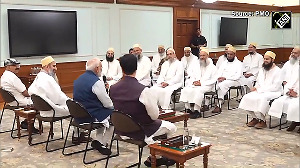The ministry of civil aviation has readied a draft policy under which commercially unviable routes from 80 Tier-III towns and cities will be offered in auction to airlines that will have the monopoly to ply to these for two to three years.
 The idea is that an airline which bids for the least subsidy from the government to run services on the route would get it. There will be just one such slot on each route.
The idea is that an airline which bids for the least subsidy from the government to run services on the route would get it. There will be just one such slot on each route.
The process is akin to what the department of telecommunications has undertaken to encourage private telecom companies to launch services in rural India, by auctioning areas (circles) to the bidder offering to take the least subsidy from the Universal Service Obligation Fund (money for which is raised from telcos at a percentage of their revenue).
A top ministry official said the draft note was expected to be announced by the end of this month. The Cabinet should be subsequently clearing it. As part of the government’s effort to develop regional air routes, as many as 40 towns which include Asansol (West Bengal), Muzzaffarpur (Bihar), Bilaspur (Chhattisgarh) and Jalgaon (Maharashtra) have been identified for the first phase.
To finance the subsidy, the ministry has already set up an Essential Air Services Fund. It is estimated that an annual subsidy of Rs 250-300 crore would be needed for the 40 places mentioned in the first phase. The money will be provided partly through budgetary support and partly from a cess on those flying between the country’s metropolitan cities.
Initially, goes the plan, the bidding for these routes will be with a subsidy. If traffic grows on a route, after a lock-in period, the same route will be re-auctioned without a subsidy, the official added.
These details have been worked out by global consultants Deloitte and are aligned with the recommendations of Naresh Chandra committee. The latter suggested disbanding the existing Route Dispersal Guidelines, meant to impel airlines to fly to remote areas. Under those rules, an airline has to deploy a tenth of its total capacity to the northeast and Jammu & Kashmir, among others. What has, however, happened is that airlines tend to fly bigger planes to commercially viable destinations within the northeast to meet the guidelines, such as Guwahati and Dibrugarh, leaving the other areas unconnected.
Operations to the towns proposed to be connected would be cheaper, goes the explanation. For, the airports and demand would mostly permit smaller aircraft, such as ATR-72s, having a weight less than 40 tonnes and so, exempted from airport taxes. More, the aviation turbine fuel in these planes would have only four per cent sales tax vis-a-vis the 24 per cent generally levied.
The ministry official said the proposed cess was unlikely to mean a rise in fares to metro cities but would make the process more transparent. “Currently, too, airlines cross-subsidise non-viable routes via travellers on the metro route but the amount a traveller has to pay is unknown. With the new system, he will know what he is paying. So, we do not expect fares to rise with the levy of this cess,” the official explained.












 © 2025
© 2025